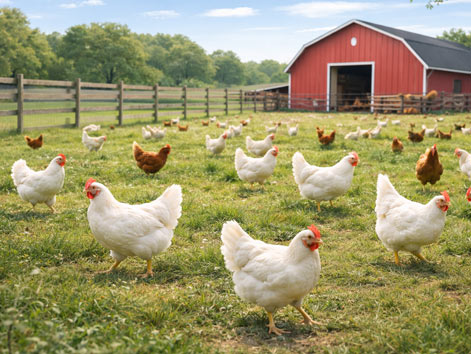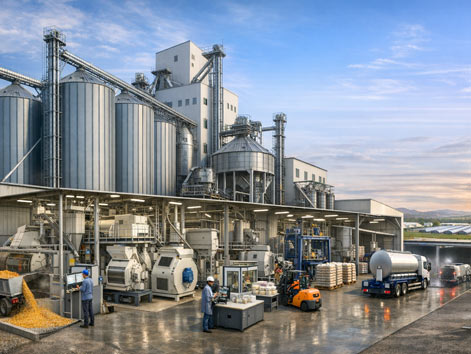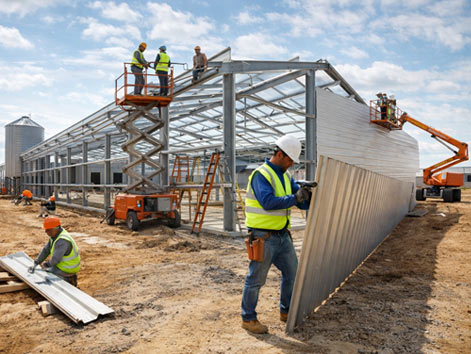Blog
Optimizing Air Quality in Poultry Production
Article by Stanley Kaye, MBA
Introduction
Air quality is a cornerstone of efficient and humane poultry farming. In a recent interview, Dr. Brian Fairchild—a Professor in the Department of Poultry Science at the University of Georgia and President of the Poultry Science Association—outlined how controlling environmental parameters can boost bird performance, reduce disease risk, and protect integrator margins. These findings are directly applicable to Agrotop’s turnkey broiler house designs, ensuring projects not only meet European health standards but also deliver on productivity targets.
1. The Critical Role of Air Quality
Poor air quality undermines genetic potential and increases condemnation rates at processing plants. Key factors include:
- Ammonia (NH₃): Elevated levels impair feed conversion and weaken immunity, leading to higher mortality.
- Carbon Dioxide (CO₂) & Carbon Monoxide (CO): Generated by birds, heaters, and microbial activity; typically managed via moisture control and ventilation.
- Particulate Matter (Dust): Requires filtration and regular cleaning to maintain respiratory health.
- Relative Humidity (RH): A master variable—above 60% RH accelerates litter moisture, ammonia release, bacterial growth, and footpad lesions; optimal RH is 40–60%.
2. Practical Management Strategies
2.1 Relative Humidity Control
- Brooding Phase: Avoid supplemental humidification; warmer brooding temperatures naturally reduce RH.
- Grow-Out Phase: Monitor RH daily; increase ventilation to halve RH with every 20 °F (≈11 °C) rise in house temperature.
2.2 Ventilation Design
- House Tightness: Seal unintended leaks so fresh air enters through ceiling inlets, warms, then removes moisture across the house.
- Tunnel Ventilation: For older birds or hot weather, exchange house air in under a minute to dry litter—even when external humidity is high.
2.3 Evaporative Cooling Management
- Delay activation until indoor air reaches around 85 °F (≈29 °C); prioritize air speed over moisture loading to prevent heat stress.
2.4 Drinker System Maintenance
- Inspect for leaks, adjust drinker height, and regulate pressure to prevent spillage, which increases floor moisture and degrades air quality.
3. Tools and Resources for Producers
- PoultryVentilation.com: Features nearly 400 extension newsletters and interactive spreadsheets (soon a mobile app) for moisture and airflow calculations.
- Poultry 411 App: Five calculators—including minimum ventilation and house tightness—guide fan runtimes and air leakage assessments to maintain moisture balance.
4. Dr. Fairchild’s Extension Philosophy & the Poultry Science Association
Since 2001, Dr. Fairchild’s applied research in broiler management has been driven by field questions, translating into graduate projects that address real-world needs. As President of the Poultry Science Association, he champions open-access dissemination through journals like Poultry Science and the Journal of Applied Poultry Research, bolstering global knowledge exchange.
Conclusion
Effective air quality management—particularly RH control—underpins both bird welfare and economic performance in modern Poultry Projects. By integrating research-backed practices and leveraging digital tools, Agrotop can further enhance the success of its turnkey broiler houses and Broiler integration services, ensuring clients achieve optimal production outcomes.
Author Bio
Written by Stanley Kaye, MBA. Stanley has over 35 years of hands-on experience in poultry farming and project management. He has attended many courses taught by Dr. Brian Fairchild and they remain friends. Stanley has always strived to apply Brian’s insights and knowledge in Agrotop projects, combining economic expertise with a passion for sustainable livestock development.
About Dr. Brian Fairchild
Dr. Brian Fairchild grew up on a North Carolina broiler farm and earned his B.S. and M.S. in Animal Science and Poultry Science from North Carolina State University, followed by a Ph.D. focusing on turkey physiology. Since 2001, he has served as Professor of Poultry Science at the University of Georgia, where his extension and applied research program addresses environmental management in broiler production. He is President of the Poultry Science Association and Editor-in-Chief of the Journal of Applied Poultry Research, and he remains dedicated to translating scientific findings into practical solutions for producers worldwide.
🧠 Engineering Air Quality into Every Agrotop Project
At Agrotop, these insights are more than theory — they shape how we design and deliver high-performance broiler houses globally. From humidity control to ventilation airflow, our infrastructure solutions help ensure every flock reaches its full potential.
🔗 Learn more about Agrotop’s turnkey poultry solutions:
📩 www.agrotop.co.il
✉️ [email protected]
📱 +84-962-548-181
A different approach
article that reviews a YouTube film



